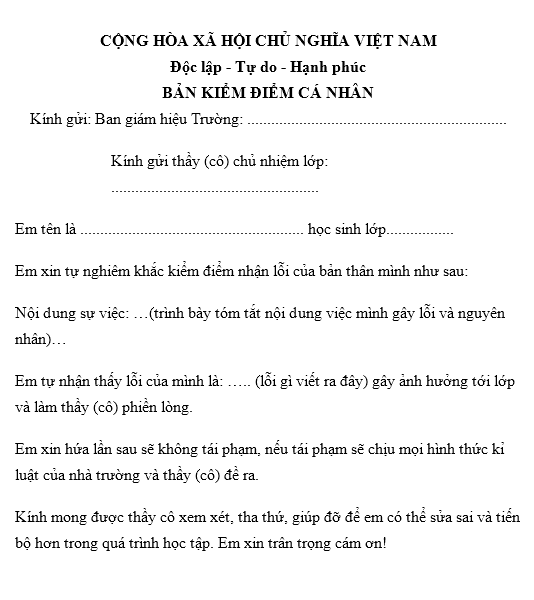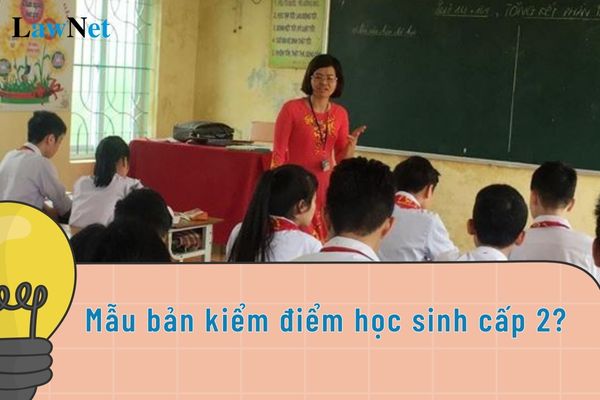What is the latest template of disciplinary report of lower secondary school students in Vietnam?
What is the template of disciplinary report of lower secondary school students in Vietnam?
The form of disciplinary report of lower secondary school student is typically used for students who have violated the school rules to write about their conduct.
The purpose of writing this disciplinary report is for students to reflect on their misconduct and learn from their mistakes.
Simultaneously, it ensures that students comply with the responsibilities outlined in Article 34 of the Charter of lower secondary schools, upper secondary schools, and multi-level schools issued with Circular 32/2020/TT-BGDDT.
*Typically, a student disciplinary report form contains the following main content:
(1) Full name, class, date of birth, etc.
(2) Description of the violation: detailing the student's infraction along with reasons for the violation. Explanation of the causes leading to the misconduct.
(3) Awareness of the wrongdoing, remediation, and commitment to change.

Download the template of disciplinary report of lower secondary school students

What is the latest template of disciplinary report of lower secondary school students in Vietnam? (Image from the Internet)
What is the age of lower secondary school students in Vietnam?
According to the provisions in Article 33 of the Charter of lower secondary schools, upper secondary schools, and multi-level schools issued with Circular 32/2020/TT-BGDDT, the age of students in lower secondary schools is regulated as follows:
Age of secondary school students
1. The age for students entering grade 6 is 11 years old. The age for students entering grade 10 is 15 years old. For those who have skipped grades in the previous level or entered school at an older age than prescribed, the age for entering grades 6 and 10 can be adjusted based on the age at the time of graduation from the previous level.
2. Minority students, students with disabilities, students with special difficulties, students returning from overseas may enter a level 3 years older than the prescribed age.
3. Students are not allowed to repeat a grade more than 3 times in one educational level.
4. Students with good physical health and early intellectual development may start school earlier or skip grades within a level. The steps for consideration are as follows:
a) Parents or guardians submit a request to the school.
b) The principal forms a Survey and Advisory Council consisting of primary representatives: school leaders, the parent representative committee of the school; the teacher of the student's current class.
c) Based on the council's survey results, the principal reviews and decides.
5. Students of appropriate age returning from overseas, children of foreigners working in Vietnam can attend lower secondary schools at their place of residence or at non-residential lower secondary schools if they are able to receive them. The steps for consideration are as follows:
a) Parents or guardians submit a request to the school.
b) The principal assesses the student's level and places them in the appropriate class.
Therefore, according to the above regulation, lower secondary school students (at the beginning level) are currently 11 years old when entering grade 6.
However, for students who have skipped a grade in the previous level or entered school at an older age than prescribed, the age for entering grade 6 may vary depending on the age at the time of graduation from the previous level.
Additionally, the following students are allowed to enter grade 6 up to 3 years older than the prescribed age:
- Students who are ethnic minorities.
- Students with disabilities.
- Students with special difficulties.
- Students returning from overseas.
What are prohibited acts of lower secondary school students in Vietnam?
According to Article 37 of the Charter of lower secondary schools, upper secondary schools, and multi-level schools issued with Circular 32/2020/TT-BGDDT, the prohibited acts of lower secondary school students in Vietnam include:
(1) Insulting the dignity, honor, or harming the physical body of teachers, staff, and other students.
(2) Cheating in studying, examinations, and admissions.
(3) Trading, using alcohol, beer, tobacco, addictive substances, stimulants, fireworks, and explosive substances.
(4) Using mobile phones and other devices during class that are not for learning purposes and without the teacher's permission.
(5) Fighting, disturbing order, and security at school and in public places.
(6) Using or exchanging cultural products that incite violence, or pornography; using toys or playing games harmful to healthy development.
(7) Violating other prohibited actions as stipulated by law.

